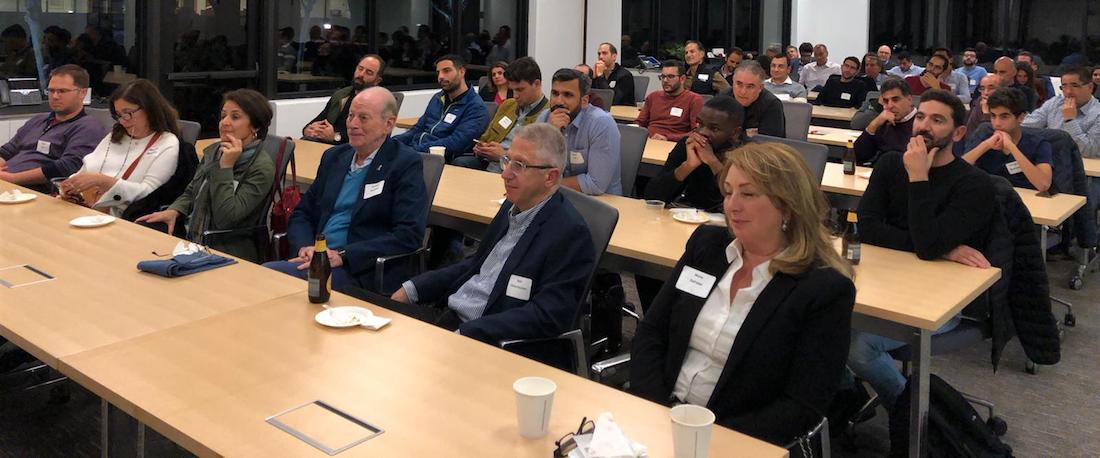Due to the important role robots are playing in increasing humans’ efficiency, and creating new skill sets for them, some might argue the fear of robots replacing human jobs might be ill founded.
Robots, retail robots more specifically, have come a long way since their first editions. Their production requires multidisciplinary teams to cover the whole customer/client satisfaction spectrum.
By giving real time data to store owners on shelf products, out of stock items and customer behaviour, retail robots are becoming an integral part of the supply chain process. To better understand how these robots operate, LebNet hosted a panel at Latham & Watkins law firm on November 14th in Menlo Park, moderated by LebNet’s co-founder Elie Habib.
The panelists were Sarjoun Skaff, co-founder and Chief Technology Officer of Bossa Nova Robotics, a robotics company that manufactures inventory control robots for use in retail stores; Georges Mirza, a leader in establishing the roadmap for vision and robotic indoor data collection for retail; and Joe Zoghzoghy, the Chief Technology Officer at Bastian Solutions, a Toyota Advanced Logistics company.
[Read our in-depth interview with Sarjoun Skaff]
LebNet’s CEO kicked-off the evening by saying: We would be remiss if we didn’t acknowledge what is happening in Lebanon today and surely, none of you needs LebNet to provide updates on the situation on the ground or words of encouragement for you to be involved and to help, but what we can do is reiterate the role that LebNet should play in helping the tech sector in Lebanon revive itself and create more jobs to help the economic development down the road. This means that our members should outsource work to Lebanon, take in Lebanese interns, mentor startups, and work with universities on research projects. LebNet will help since these are established programs we have in place. For more info email us at [email protected]]
After the panel ended, two Lebanese startup founders currently attending a 5-week Silicon Valley bootcamp at Draper University, as part of the LebNet Ignite program, delivered 2-min pitches in front of the audience. The startups were Lemonade Fashion, a global marketplace for custom made designer outfits, and Oreyeon, a startup building solutions for the aviation industry, enabling operations and safety optimization.
Robots are here to stay but..
Sarjoun Skaff’s Bossa Nova robots navigate stores and provide real-time on-shelf product data for the retailer. They are currently deployed in 350 stores across the United States. He believed that that the future of brick and mortar retail is very intertwined with automation and analytics. “The pressure coming from Amazon is driving retailers to become more efficient, and the prices have to go down so the margins are being compressed. The only way to fight back is with automation and data,” he said.
Georges Mirza, who wrote previously about adopting robots in stores, believes that robots will become more mature once they optimize the way they process data, produce shelf insights and scale. “You need the robot to go down the aisle, scan and collect data, but really the solution does not become valuable until you do the processing, and that is very complicated. Right now, the knowledge retailers have about the shelf could be obsolete shortly after setting the planogram because somebody moved products around. At scale, the near real time shelf data provided by robots will deliver the spatial insights needed. When married with point of sale data it will enable assortment optimization and efficient supply chain that the ecosystem has been striving for and ultimately shopper satisfaction.” he said.
If at first you don’t succeed, try 17 more times
The hardware part is merely the first step of designing a robot. Zoghzoghy, who is CTO at Bastian Solution, a company that offers automated solutions for distribution, manufacturing and order fulfillment centers, admitted they had to redo the design of the robot 17 times.
“We did everything from scratch so if the robot breaks, we could fix it,” he said. Their robots work in the warehouse, where they often have to scan boxes with no tape, labels or barcodes and this poses a big challenge. The different lighting in each warehouse also affect scanning. While Bastian Solutions’ robots operate in warehouses, Skaff’s robots are faced with customers all the time and this creates a different set of challenges: the design of the robot needs to be appealing, the robot should navigate safely, scan entire items from front to back, and record data when robots go offline. To solve the scanning challenge, Skaff said they started scanning barcodes instead which includes all the product details.
One concerned question from the audience was about the future of human jobs. Despite the fact that margins of error are reduced with robots, Zoghzoghy is certain robots will not eliminate all human jobs, but create new types that will grow the economy, decrease prices, increases sales and the GDP in a said country.
Mirza stated that robots will help us become better workers. “Humans don’t have to work as hard as they do today, but they will become more focused on more important non mundane tasks. They’re not reducing jobs but hours.”
So there’s a light at the end of the tunnel. Robots are getting smarter because humans are getting smarter. With more competition, this sector will only get better at serving customers and increasing efficiencies.
